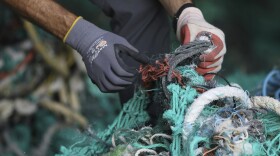Among the bills passed by the legislature and awaiting the signature or veto of Governor Ige is Senate Bill 1240. Its topic is aquarium fish. The measure would end the collection of reef wildlife for the aquarium trade. We recently aired a commentary by Robert Winter, President of Snorkel Bob’s Hawai‘i—who believes the governor should sign it. Today we have an opposing view point from Bruce Carlson, a retired marine biologist and former director of the Waik?k? Aquarium. He believes the bill should be vetoed and contributed this commentary to Hawai‘i Public Radio.
The views expressed in commentaries are those of the writer, and do not necessarily reflect the views of Hawai‘i Public Radio. If you have a proposal for a commentary, you can email it to news director Bill Dorman at bdorman@hawaiipublicradio.org.
I grew up on the mainland and spent many long winter days watching the tropical fish in my aquariums, and they inspired me to learn more. In 1975, I found myself at the University of Hawaii where I studied Hawaii reef fish and fulfilled my dream of a Ph.D. Now I’m retired, living in Ewa Beach, speaking on behalf of fishermen who are collecting the same species of fish that inspired me, and maybe the next generation of marine biologists as well. But these fishermen are close to being shut out of their jobs due to a relentless campaign of fake science and biased public polling. Special interest groups opposed to aquarium fishing pushed through Senate Bill 1240 that is now being considered by the Governor. Should it take effect, it will hurt people and small businesses, and for some these are the only jobs available that provide a living wage.
The fishermen and the Department of Land and Natural Resources have neither the money nor the means to run a public relations campaign to counter animal rights groups opposed to aquarium fishing. But fishermen and DLNR have worked together, creating a well-managed, sustainable fishery. This is a story that you must hear: For 17 years, DLNR biologists have conducted extensive underwater surveys, nearly 7000, to monitor the populations of aquarium fish species on the Kona coast, where the major aquarium fishery is located. The result is the fishery is stable and sustainable. There is no evidence of ecological harm to the reefs. In fact, the populations of yellow tang and kole on the Kona coast, even in areas that are fished, are significantly higher than marine protected areas on Maui and even Papahanaumokuakea.
The involvement of the Kona community, fishermen and government established a network of areas closed to fishing that contributed to the success of this model fishery. It is the best managed aquarium fishery in the world and should be a shining example for other fisheries. Instead it is being vilified with the support of large well-funded mainland organizations, driven by their philosophical opposition to aquariums.
Why can’t we value our aquarium fishery for the economic and educational benefits it creates? The Hawaiian yellow tang is in aquariums around the world, where kids and adults can marvel at its beauty, and imagine coming to Hawaii - just like I did. Don’t kill this fishery simply because local fishermen are unable to stand up to the propaganda of well-funded special interests.



